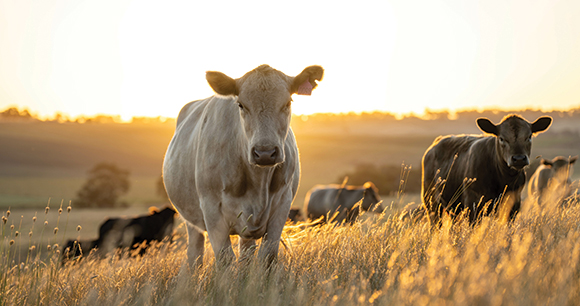Low-Stress Livestock Handling to Deter Predators
by Dr. Naomi Louchouarn, University of Wisconsin-Madison
In the Northern Rocky Mountains, ranchers raising livestock on public lands often advocate the use of lethal control measures to protect their livestock and control large carnivores. While large carnivore attacks on livestock are far from the primary threat to livestock health, the perception of them as a malicious force on the landscape has put the return of these predators at risk. Federal and local governments in the United States and Canada have allowed lethal control to various degrees to ostensibly reduce the risks of attacks on livestock.

But is lethal control really the best way to stop large carnivore attacks? A group of researchers led by Drs. Lily van Eeden, Jennifer Miller, Ann Eklund, and Adrian Treves published a metareview in PLOS Biology in 2018 examining the literature on different forms of livestock protection from large carnivores. They found that in 45 percent of cases, lethal control either did not change or actually increased the risk of attacks by carnivores on livestock. The scientists called for additional research on carnivore deterrence methods to improve livestock and carnivore coexistence.
Using funds from the Christine Stevens Wildlife Award, I was able to conduct the first gold-standard study on one such method of carnivore deterrence in Alberta, Canada. In this study, I collaborated with Dr. Adrian Treves of the University of Wisconsin-Madison and Joe Engelhart, an Albertan rancher, to develop an experiment testing a nonlethal method of range riding known as low-stress livestock handling (L-SLH) that focuses on the cattle, not the carnivores. The method was first developed by Dr. Temple Grandin and Bud Williams as a way to reduce the stress livestock experience on the range and improve their health while deterring carnivores.
Mr. Engelhart is one of the few ranchers in North America employing L-SLH. To maintain low stress in his herds, he monitors his cattle often, encourages them to stay closely bunched, and allows them to determine the pace as they move between pastures. This method allows the cattle to act more as a wild herd and minimize their own vulnerability to predator attacks. Traditionally, ranchers move their cattle as quickly as possible between pastures. This causes them to resist herding, which is counterproductive to protecting them from carnivores.
In this study, we hired additional range riders and designed a randomized controlled experiment to test the effectiveness of L-SLH at deterring a suite of large carnivores: wolves, grizzly bears, black bears, cougars and coyotes. Of our eight treatment and control herds, all were subject to routine observation by Mr. Engelhart approximately every nine days while our treatment herds were observed every one to three days by two newly trained range riders. All eight herds were subject to treatment and control conditions during the study.
While no livestock were lost from either our treatment or control herds during the experimental trials, carnivores were consistently observed around all herds. We found that thousands of cattle can be safely grazed on public lands using L-SLH. This gold standard experiment demonstrates that L-SLH, even with a smaller number and relatively inexperienced riders, can keep livestock safe from predator attack under conditions that are less stressful for them. This benefits the livestock and promotes peaceful coexistence with native carnivores.
This study was funded by the Christine Stevens Wildlife Awards program. To learn more about this program or to view additional studies, click here.
Program Terms: Farmed Animals, Terrestrial Wildlife
AWI Quarterly Terms: Feature Article
Related News
IUCN Reaffirms Long-Tailed Macaques’ Endangered Status Despite Industry Pressure
In Program: Terrestrial WildlifeThe International Union for Conservation of Nature (IUCN) today released an update to its Red List of Threatened Species. The update revealed that the long-tailed...
Titus Reintroduces Humane Transport of Farmed Animals Act as New AWI Report Reveals Feeble Enforcement of Welfare Violations
In Program: Farmed AnimalsToday, US Rep. Dina Titus (D-NV) reintroduced the Humane Transport of Farmed Animals Act to improve conditions for livestock transported across the United States. The bill would...
AWI Funds Research to Alleviate Human-Wildlife Conflicts, Animal Suffering
In Program: Terrestrial WildlifeThe Animal Welfare Institute (AWI) announced today the eight recipients of its Christine Stevens Wildlife Award who are developing humane solutions to human-wildlife conflicts and...
Refuge from Cruel Trapping Act Reintroduced to Protect Wildlife and Pets on Public Lands
In Program: Companion Animals, Terrestrial WildlifeThe Animal Welfare Institute (AWI) endorses the Refuge from Cruel Trapping Act, reintroduced today in the US House of Representatives by Rep. Jerrold Nadler (D-NY)....